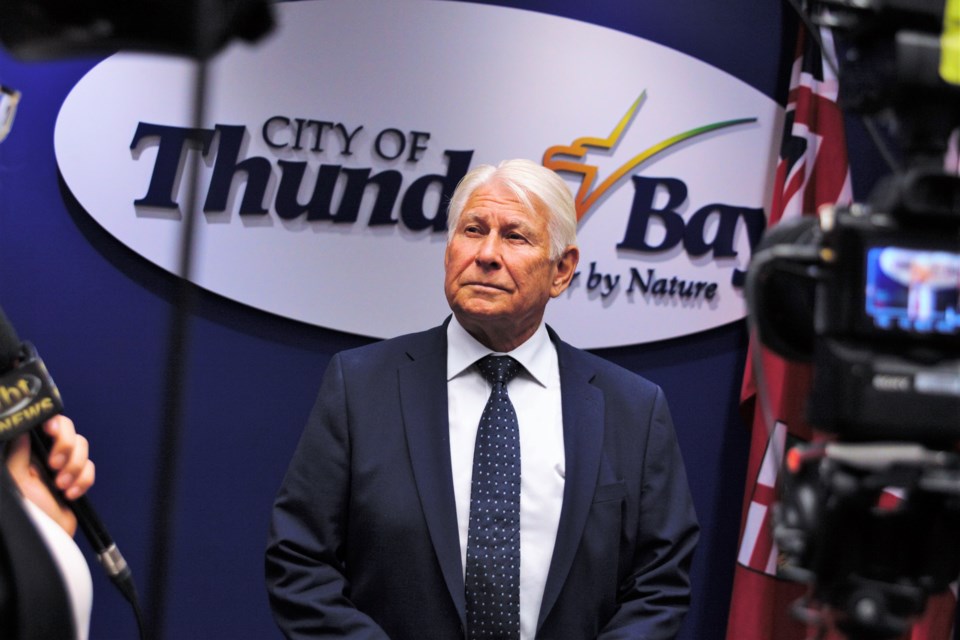THUNDER BAY — Mayor Ken Boshcoff could seek new strong mayor powers from the province regardless of whether his 12 city council colleagues agree with the move.
In a city press conference held Wednesday to outline what would change under the strong mayor system, Boshcoff said he hopes to earn council’s endorsement for the step when the issue is discussed at a Monday meeting.
However, he didn’t rule out requesting the powers even without council’s support.
“I would have to really think about that, but I’m certainly hoping that council will back me up,” he said when asked about the possibility.
Whether council will endorse a change that would transfer significant amounts of its own power to the mayor’s office is far from certain.
Several city councillors have expressed alarm over the new powers, saying they undermine local democracy and place too much authority in the hands of one person.
Premier Doug Ford announced the expansion of strong mayor powers to 21 new cities including Thunder Bay in August. The province had already bestowed them on 29 of Ontario’s largest cities, beginning with Toronto and Ottawa last year.
The move has been received with skepticism by many municipal leaders, with a number of mayors pledging not to make use of the new powers.
A recent article in The Trillium called Boshcoff “an outlier” among leaders of smaller municipalities, because he was the only mayor interviewed to welcome the powers.
Unlike Boshcoff, mayors of many other communities, including Sault Ste. Marie, Sudbury, and North Bay, have stated the powers are not necessary to achieve housing goals.
Asked why his views diverge from those of other mayors, Boshcoff retorted, “I’ve talked to dozens of them, but I have not heard any of them objecting.”
He noted the vast majority of mayors have not formally rejected the powers, even if they have promised not to use them, and have submitted a housing pledge as requested by the province.
He also suggested some of the opposition to the strong mayor powers may stem from “partisan” feelings against the PC government.
The strong mayor regulations would allow Boshcoff to hire and fire the city manager and other senior staff, reorganize city departments, and propose the city budget subject to council amendments, among other changes.
The powers also allow mayors to pass bylaws with the support of just one third of council, and veto bylaws passed by council, in cases involving provincial priorities.
Those priorities for now includes the Ford government’s goal of seeing 1.5 million homes built across Ontario by 2031, but could be expanded in the future through regulation.
City staff outlined further details of how the powers will be implemented in a report that will be presented to council on Monday.
On Wednesday, Boshcoff said he plans to use the new powers rarely.
Asked specifically if he would rule out firing the city manager and other senior staff unilaterally, without consulting council, Boshcoff appeared to do so.
“It's almost impossible for me to make decisions of that impact without consulting council,” he said. “I'm not a one-person show and I've always been a team player, so you can bet that those kinds of things aren't going to happen unilaterally… That’s not me.”
Asked if he would rule out vetoing resolution passed by council, Boshcoff was slightly less categorical.
“It would really take something [of an] outlier that probably is so controversial that it would be a 7-6 loss… or something like that,” he said.
“To me, I’m a democrat,” he added. “Granting some of these powers means they have to be used wisely and democratically. So I don’t really see drawing on them very often.”
Boshcoff said he isn’t worried that future mayors may not share that approach.
“I do believe that people who seek the mayor's office will be chosen wisely by the community, so I really don't have that fear,” he said.
To receive the powers, Boshcoff must simply commit in writing by Oct. 15 to meet a target for new home builds. The new powers would take effect on Oct. 31.
Thunder Bay’s target is identified as 2,200 new housing starts by 2031.
That would require the pace of new housing builds to accelerate by over 60 per cent, compared with the past five years.
Boshcoff has said he’s optimistic that could be achievable, citing a regional mining boom, while others have expressed concern the target is unachievable.
Boshcoff called endorsing the province’s housing target important largely because it will make the city eligible for the new $1.2-billion ‘Building Faster Fund.’
Municipalities that achieve 80 per cent of their housing targets in a given year will receive grants through the fund. City leaders said Wednesday they were still awaiting further details on the program.
Dollars from the Building Faster Fund could be put toward “housing-enabling infrastructure” like site servicing, roads, and public utilities.
Boshcoff has called extending those city services crucial to support the construction of new subdivisions. Others on council, meanwhile, have warned that could worsen urban sprawl and cut against the city’s climate commitments.
